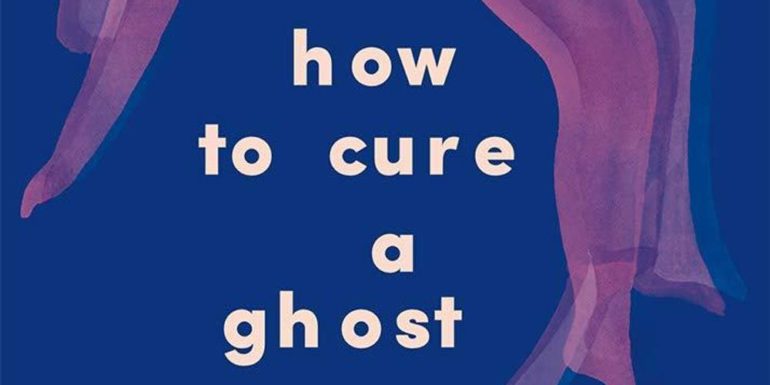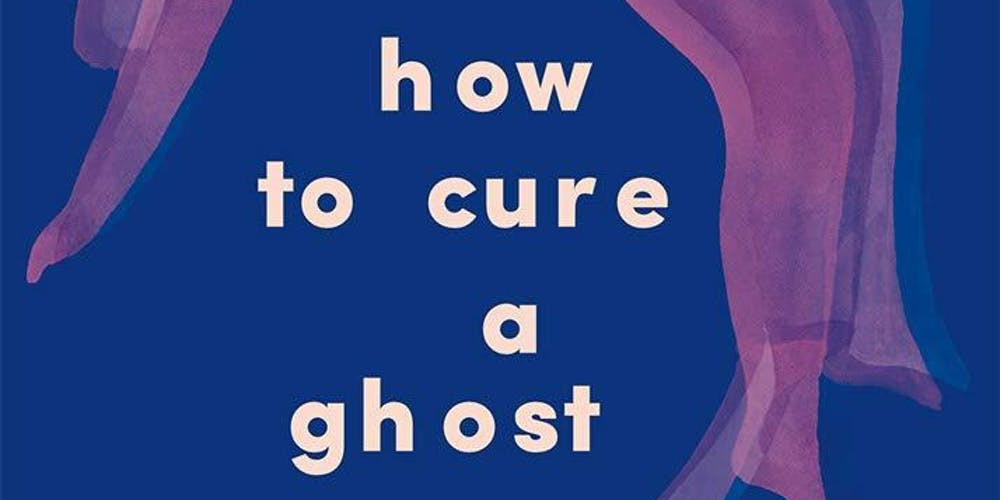Fariha Rósín’s debut poetry collection ‘how to cure a ghost’ is a journey 158 pages long. Its purpose is a personal exploration of identity, especially concerning the poet’s experiences of being ‘queer, Muslim and femme’. Race, religion, gender, sexuality and family relationships are all picked apart in intense detail and focus, the rise and fall of their insights concluding beautifully on a note of gentle self-acceptance.
The final poem, ‘this one’s for me’ is a triumphant cry of survival and overcoming, especially poignant when the world is not good at being kind to those simply seeking to be themselves. This is another message strong among the blue and purple pages. On an aesthetic note, this is a really pretty book. The artwork is bold and intriguing, blending well with the poems.
Rósín’s words are not easy to read, but well worth the effort. This is a memoir in metaphors, a determined claiming of one’s identity from those who have attempted to dilute and diminish it. This is an angry scream at misinformed history and oppression. Through ‘the night of the cactus’, I learned that Muslims were already performing cataract operations while Queen Elizabeth I ruled, a truth rarely mentioned when we are taught about colonization and empire building.
Many of the poems, while beginning or honing in on personal experience, also sweep out to the wider context of the world, with titles such as ‘mansplain nation’, ‘the many descriptions of being brown’, ‘i really really care, don’t you?’ and ‘what 9/11 did to us’. After all, as this book explores, identity is shaped by culture, what parts of history we are taught, our family, our experience of the world and our experience of other people’s perception of us. Rarely is it as obvious as it is among these poems that every person, every self, contains the whole world.
The poem ‘two of swords’ is dedicated to ‘my brown girls who never felt they had representation’, and this here is a very compelling reason to read this collection for yourself, whether the experiences of the writer reflect or oppose your own identity and self. For those like Rósín, it’s a battle cry, and for those who are different it’s a signal flare – see me, know me, accept me.
The importance of representation in all creative areas, for all groups, cannot be undervalued. It changes how you view yourself, and what others understand about you. It’s only through a conscious effort on our part to understand, to see what has been done and what is still being done, that we can begin healing. Through seeking honest, varied representation of those who do not look and think and experience like us, we come to appreciate how similar all people actually are.
It really didn’t take long to find a connection in this collection. ‘self-portraiture’ with its numbered verses described an ache for self-love and for love from others. It talked about feeling unseen and undervalued, wondering ‘is everyone laughing at me?’. These threads of connection pulled me closer to keep reading and keep understanding. We’re all gifted with puzzle-box minds and poetry is the riddle we etch on its surface to help others unlock both us and themselves.
Amongst the pain a lot of hope is to be found, with poems like utopia overflowing in lyrical idealistic description. While speaking so bleakly of hate and racism, of war and immigration, of abuse and shame, this collection also aches desperately about love. There’s brief flashes of humour, woven snippets of French and Arabic, and a captivating use of punctuation and the space on the page.
I’ve always loved works that play with the rules and make their points with an absence of capital letters, with an extra space or an & instead of an ‘and’. There were a couple of places where an experiment felt a little like a typo, but these were quickly overshadowed by the urgent message of the piece.
Poetry is often undervalued and under-discussed, much like many of the topics covered in ‘how to cure a ghost’. I’m so glad I read this raw, relevant, honest collection – it demonstrated all the best ways poetry can be powerful. And it described Trump’s hair as a ‘deflated soufflé’.
Read authors that will make you cry, read poets that will make you think, seek the creations of your complete opposites. It’s a small step towards curing our ghosts.
And start with Fariha Rósín’s poetry.
Review copy provided
Some of the coverage you find on Cultured Vultures contains affiliate links, which provide us with small commissions based on purchases made from visiting our site. We cover gaming news, movie reviews, wrestling and much more.




